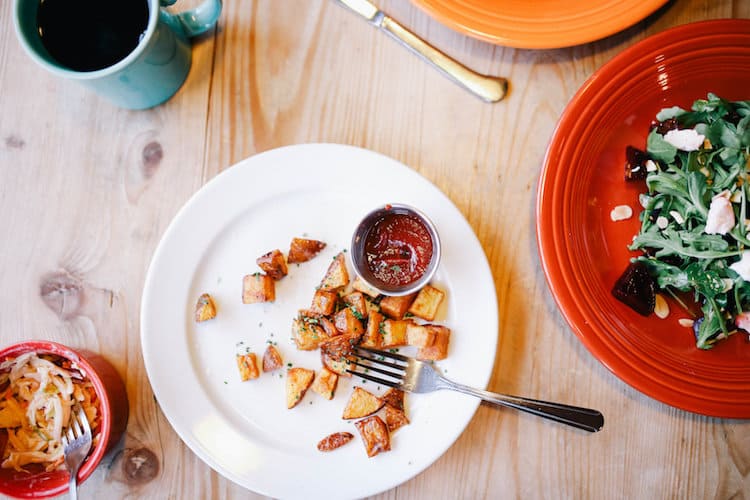Ditch the diet: 4 ways to eat guilt-free

Changing habits is an emotional processes by nature. They can be borne out of unhappiness, an intrinsic motivation such as being able to keep up with one’s kids, or simply a desire to lead a healthier lifestyle. Whatever the reason, lifestyle changes are often deeply personal. While some people love engaging in health and fitness communities, others would rather keep their information in a private app and never say a word about their goals. But no matter how you slice it, almost anyone who is trying to make a change in their diet has experienced food-related guilt. One study found that 80% of women and 70% of men suffer from food guilt. So what is food guilt and why does it happen to so many people?
Food guilt is most often induced by eating “bad” foods – candy, pizza, cake – which may be considered outside the normal range of “healthy” foods. It can be onset by a “bad” meal or, for some people, even just a bite of a food they would not normally eat.
What is it about these foods that make us feel guilty? It’s different for everyone. Generally speaking, American society’s obsession with healthy eating can make it seem “better” to opt for a salad (nutritious, lower in calories, green) rather than a burger (oily, higher in calories, processed). In some cases, people have arbitrarily decided (perhaps after reading a misguided article or two) what foods are “good” or “bad” and feel guilty after eating a “bad’ food as a result of this categorization.
Think about it: the holiday season is inevitably full of indulgences. Did the thought of exercising for a bit longer or eating less cross your mind? It’s a natural reaction, but it’s a reaction we can all live without.
If you want to beat food guilt, think about why you have it in the first place. What triggers your guilt? It might be specific foods or it might be an internal feeling. Now think about why. Do you feel bloated after you eat it? Did someone once tell you that X food was healthier than Y food and now you feel bad after eating Y food? Once you find the root of your guilt, you can start to alleviate it.
Don’t be competitive. Have you ever gone out to eat in a group and had someone announce that they were going to “be good” and get a salad? You had been working hard that week and you were ready (and excited!) to reward yourself with a treat meal. This little announcement might cause you to rethink your choice. Don’t let it! Other people’s diets and food choices have no impact on your personal diet. People who announce their food choices are probably just looking to be rewarded with kind comments by others. Don’t let their insecurity get you down.
Don’t try to “work it off.” We’ve all been there: you eat a few too many cookies, then pledge to hit the gym extra hard the following day. Bad news: you can’t out-exercise a poor diet. In fact, exercising is the least efficient way that our bodies burn calories. So what should you do? Don’t worry about it. In order to gain one real pound, you would have to eat 3500 calories over your caloric limit. That’s over 5000 calories in a day! As long as you’re not going over your calorie budget on a regular basis, one day won’t derail your diet. So forget about cookies of the past and just keep sticking to your plan.
Don’t get angry. If you become angry at yourself after eating more than planned, think about why. You know one or two “out-of-the-ordinary” meals won’t reverse all of your progress. If you let minor setbacks get to you, you could be getting into a dangerous mindset. If you try to restrict and lower your calories below what Noom has set for you, you are likely to binge later on. This binge-restrict pattern is very difficult to get out of once it’s become habit. The best thing you can do for yourself after overeating is to continue as planned. Don’t try to account for the extra food, and don’t be angry at yourself. Everyone slips up in dieting, even those who have done it countless times. Forgive yourself and move on.
Remember, food is not the enemy. Food isn’t meant to torment you. It’s meant to be pleasurable and even fun! You need food to live, so you might as well enjoy it every time. Food is a wonderful activity to enjoy with those you love, or even solo. Try to savor every meal you eat and don’t get too concerned about every single calorie going into your body. If you follow the basic rules of Noom, you will see the results you deserve.

